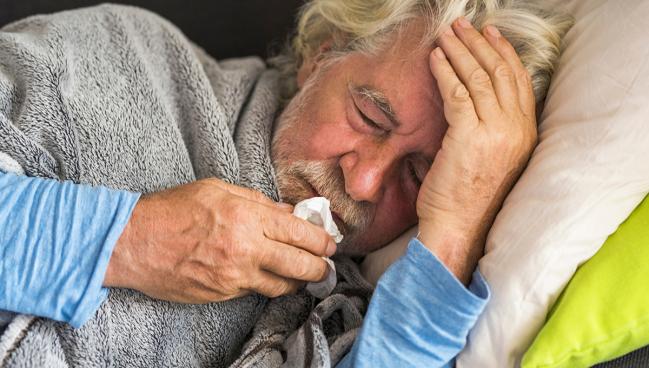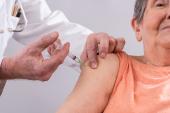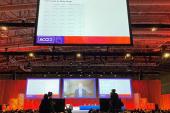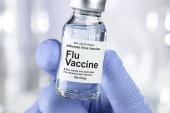Large RCTs of High-Dose Flu Vaccines Doable, DANFLU-1 Confirms
While underpowered to show clinical benefits, the trial hints at the possibility of fewer hospitalizations and deaths.

Randomizing a large population of adults to receive either a high- or standard -dose quadrivalent influenza vaccine is feasible, and while the DANFLU-1 trial was not powered for clinical endpoints, it hinted at reduced hospitalization for influenza or pneumonia and all-cause mortality with the higher dose.
The design of the “pragmatic randomized trial [using] existing infrastructure for recruitment, inclusion, randomization, and vaccination and relying solely on registry-based data collection” can now be applied to “future fully powered vaccine trials as well as to trials investigating other interventions,” said Niklas Dyrby Johansen, MD (Herlev and Gentofte Hospital, Denmark), who presented the DANFLU-1 findings Saturday at the European Society of Cardiology (ESC) Congress 2022.
Senior investigator Tor Biering-Sørensen, MD, PhD, MPH (Herlev and Gentofte Hospital), told journalists at an ESC press conference that his team is “definitely” planning to conduct the fully powered randomized trial, which will need 208,000 participants to properly assess both hospitalizations for pneumonia or flu and also cardiovascular outcomes.
The findings come on the heels of both the IVVE trial presented at the American College of Cardiology 2022 Scientific Session, demonstrating a reduction in MACE during flu season, and a meta-analysis published in JAMA Network Open in May, showing the flu vaccine can reduce major cardiovascular events by as much as one-third compared with placebo. Also, the INVESTED trial in 2020 showed no added benefit but also no harm with the high-dose flu vaccine among patients with a recent MI or heart failure hospitalization, compared with a standard-dose vaccine.
Feasibility Achieved
For the study, Johansen and colleagues used Danish nationwide administrative health registry data to randomize 12,551 adults ages 65 to 79 years (mean age 72 years; 47% female) to receive either standard or high-dose influenza vaccines during the 2021-2022 flu season. While the investigators initially planned to include at least 40,000 participants, regulatory approvals were delayed, thus limiting the number of participants that could be recruited and enrolled. Still, they managed to enroll 11,463 within the first 15 days.
Over 6 months of follow-up, the relative vaccine effectiveness (rVE) seemed to be higher for the high versus standard vaccine dose. The incidence of hospitalization for pneumonia or flu was lower for those who received the more-potent vaccine (10 vs 28 events; rVE 64.4%; 95% CI 24.4%-84.6%). Similar trends were observed for hospitalization for respiratory disease (24 vs 40 events; rVE 40.1%; 95% CI -1.8%-65.5%) and cardiorespiratory disease (103 vs 117 events; rVE 12.1%; 95% CI -15.5%-33.3%) but not for cardiovascular disease (81 vs 82 events; rVE -1.0%; 95% CI -39.1%-26.6%) or any hospitalization (513 vs 550 events; rVE 6.9%; 95% CI -5.2%-17.6%). Researchers did, however, find significantly fewer all-cause deaths among those who received the high-dose vaccine (21 vs 41 events; rVE 48.9%; 95% CI 11.5%-71.3%).
Everything we've learned in the pandemic is that it turns out vaccines and science still matter. And that they can still help you and your family. Jacob Udell
There were also no differences observed between the study groups in terms cardiovascular death or hospitalization for MI, atrial fibrillation, stroke, or heart failure. Cardiovascular serious adverse events were less frequent in the high-dose group (1.0% vs 1.4%; P = 0.047), with no other significant differences in adverse events observed.
The presenters stressed that the study was not powered to detect clinical outcomes. “Whether I would choose the high dose for my own patients, . . . to prevent the flu, yes, I would recommend the high-dose vaccine,” Biering-Sørensen said. “But not to prevent hospitalizations. These data are only hypothesis-generating. . . . We only tested the system. We tested whether we could do this.”
High-Dose Vaccines ‘Safe’
Discussing the study in the main session, Ole Fröbert, MD, PhD (Örebro University, Sweden), said the fact that DANFLU-1 was an all-comers trial means “we can generalize from the findings and, most importantly, we know now that it's safe to give high-dose vaccines.”
While the trialists didn’t enroll their intended 40,000 participants, Fröbert said a feasibility trial of 12,000 patients is “quite unheard of and impressive.” The fact that it was open label was “probably a minor issue in a trial with a single influenza vaccination,” he continued, adding that influenza vaccine effectiveness varies from season to season. The fact that the trial was conducted during the COVID-19 pandemic was both a strength and a limitation, Fröbert said. “It's impressive that the investigators were able to conduct a trial during COVID-19, but it probably meant that there was less influenza around and it could have affected the number of endpoints.”
To put the results in perspective with the INVESTED data, he said both trials “demonstrated that high-dose vaccine is safe.” As for whether or not it can reduce all-cause death, which the INVESTED trial did not show, Fröbert said “perhaps there's little to gain from a high-dose influenza vaccine if you're already receiving guideline-directed medical therapy for your disease.”
At this point, “the role of high-dose influenza vaccine in cardiovascular disease is still unresolved but it's likely the best choice for 65-year-plus citizens,” he said. “We need more studies and we also need cost-benefit calculations.”
Fröbert also called for an upgrade from a 1B to a 1A recommendation for influenza vaccination in cardiovascular disease as well as for it to be standard of care to provide influenza vaccines at hospital discharge for cardiovascular disease. “It's time that we as cardiologists take responsibility,” he said.
Confronting the Naysayers
Commenting on the results for TCTMD, Jacob Udell, MD, MPH (University of Toronto, Canada), who served as co-principal investigator of the INVESTED study, also said he was amazed by how many participants the researchers were able to enroll so quicky.
Even though DANFLU-1 was a feasibility study, he said “it’s still important that we demonstrated, particularly for all the naysayers out there, that a high-dose flu shot here compared to a standard flu shot . . . actually reduced influenza or pneumonia in this at-risk patient population.” Even though he cautioned against overinterpreting the results, a risk reduction of about 30% is “huge,” Udell added, because many people still don’t believe that flu shots work.
He recommended using the high-dose vaccine, if available, in all people over the age of 65 years with comorbidities, viewing it like a vaccine plus booster all in one. “Do I think it could work in younger patients? Absolutely,” Udell said. “It's like the question of using high-dose statins in younger primary prevention versus secondary prevention [patients], in that some people may not need that intensive dose at a more primordial stage of risk. Sometimes you might see some more local side effects that might discourage its use in that population, and so there's that balancing act of when and where to use the high dose. It's not yet approved for use in all-comers; it's provocative to ask the question whether it could be.”
Udell said he looks forward to seeing the results of the fully-powered DANFLU-2 study as well as other similar ones that might be conducted in other parts of the world.
“Everything we've learned in the pandemic is that it turns out vaccines and science still matter,” he said. “And that they can still help you and your family. And that it is something that strongly should be pursued.”
Yael L. Maxwell is Senior Medical Journalist for TCTMD and Section Editor of TCTMD's Fellows Forum. She served as the inaugural…
Read Full BioSources
Johansen ND. DANFLU-1: feasibility of a pragmatic randomized trial to assess the relative effectiveness of high-dose vs. standard-dose quadrivalent influenza vaccine on severe cardio-respiratory outcomes in elderly adults. Presented at: ESC 2022. August 27, 2022. Barcelona, Spain.
Disclosures
- The DANFLU-1 trial was sponsored by Sanofi.
- Johansen reports no relevant conflicts of interest.
- Udell reports serving as co-principal investigator of the INVESTED trial.





Comments